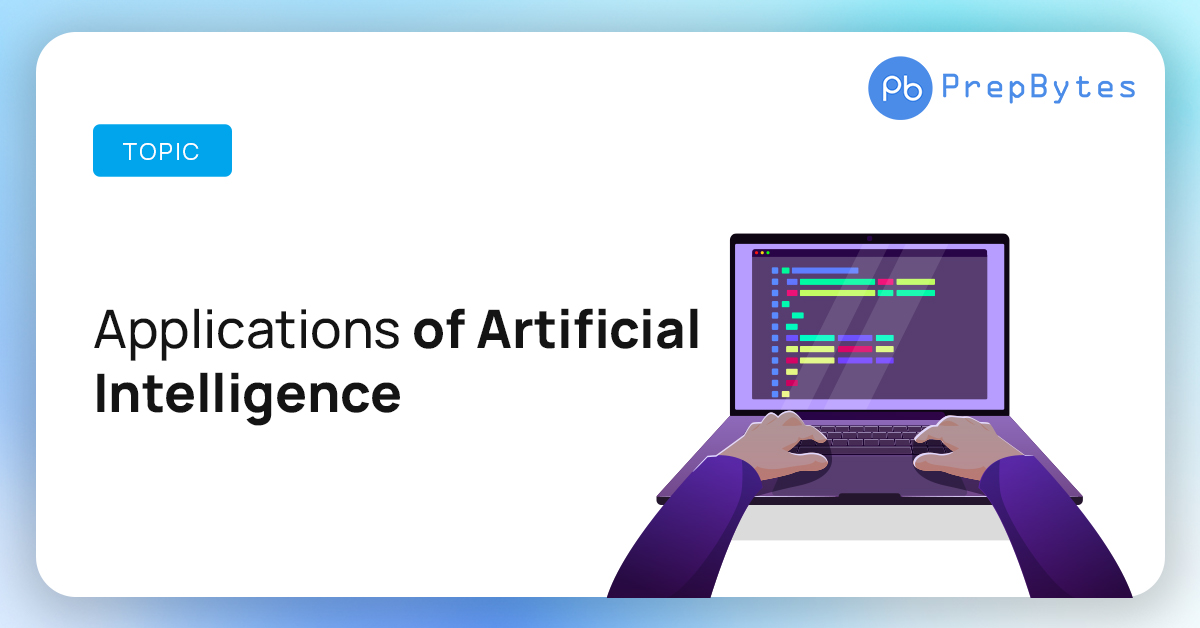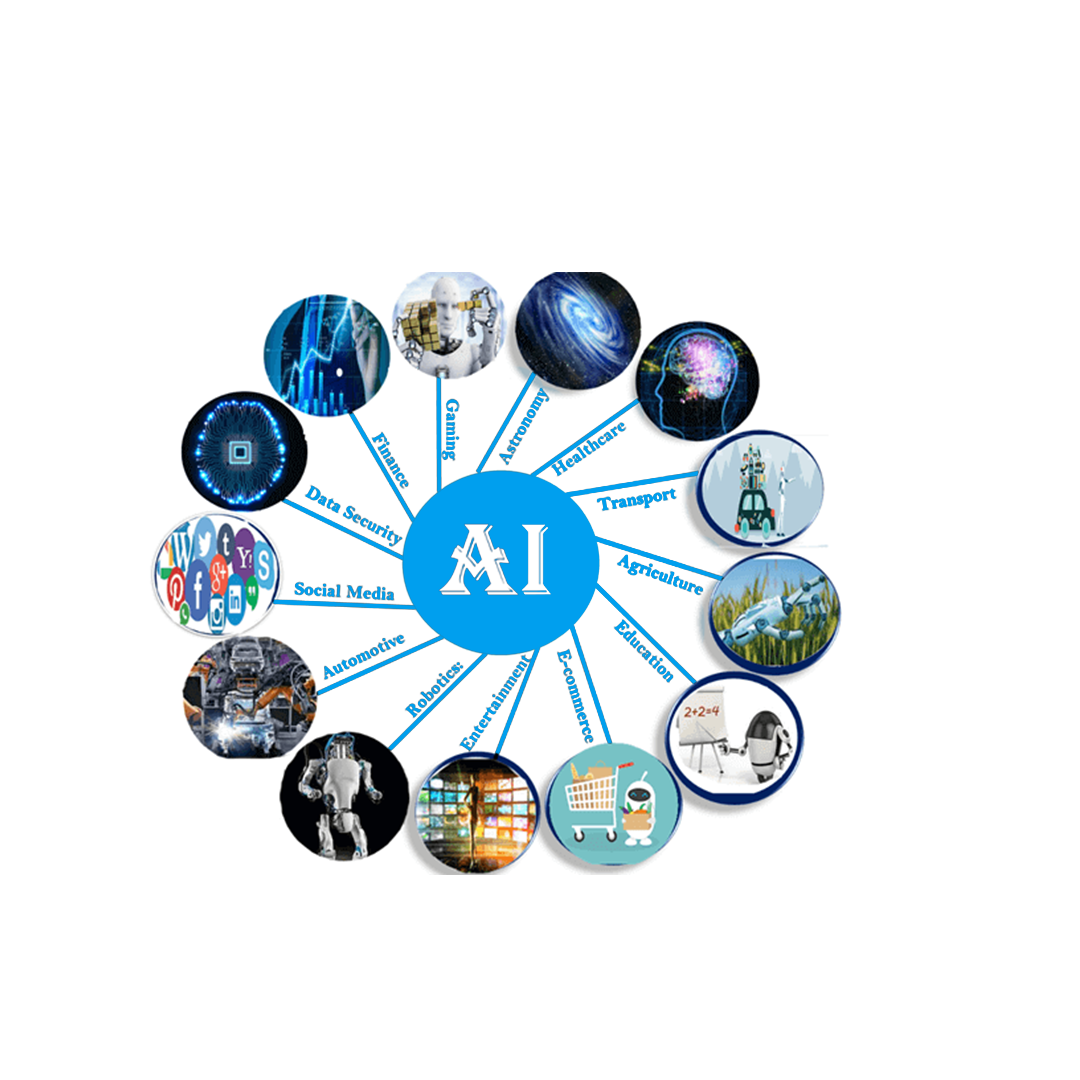Last Updated on April 26, 2023 by Prepbytes

The applications of artificial intelligence involve using algorithms and machines to simulate intelligent behaviour in order to perform tasks that would otherwise require human intelligence. Artificial Intelligence is important because it can help automate processes, make predictions, and solve complex problems at a faster pace and with greater accuracy than humans.
Introduction to Artificial Intelligence
Artificial Intelligence (AI) refers to the development of computer systems that can perform tasks that would typically require human intelligence, such as visual perception, speech recognition, decision-making, and language translation. AI is achieved through the use of machine learning, neural networks, natural language processing, and other technologies that enable machines to learn from experience and improve their performance over time. The goal of AI is to create intelligent machines that can think, reason, and learn like humans, and can be applied in various fields, including healthcare, finance, education, and transportation.
Characteristics of Artificial Intelligence
Artificial Intelligence has several key characteristics, including:
- AI systems can learn from data and experiences, improving their performance over time.
- AI can use logical reasoning to draw conclusions from available information.
- AI can understand, interpret, and respond to human language.
- AI can sense and interpret the world through sensors, cameras, and other devices.
- AI can generate novel solutions and ideas that were not explicitly programmed.
- AI can adjust and adapt to new situations and changing circumstances.
- AI can operate independently, without human intervention, in some cases.
Some of the Applications of Artificial Intelligence
Here, are the applications of artificial intelligence:
- AI in Astronomy: AI is used to analyze and interpret vast amounts of data from telescopes, helping astronomers to identify patterns, discover new celestial objects, and optimize the design of telescopes and instruments.
- AI in Healthcare: AI is used to improve patient outcomes by analyzing medical data, assisting with medical imaging, developing personalized treatment plans, and accelerating drug discovery and development.
- AI in Gaming: AI is used to create intelligent game characters, improve gameplay, and optimize game design and development.
- AI in Finance: AI is used for fraud detection, risk assessment, portfolio optimization, and customer service in the finance industry.
- AI in Data Security: AI is used to identify and prevent security threats, detect and respond to data breaches, and improve overall data security.
- AI in Social Media: AI is used to analyze user data, personalize content, detect and remove harmful content, and optimize advertising and marketing strategies.
- AI in Travel & Transport: AI is used to optimize transportation routes, reduce traffic congestion, and improve customer experience in the travel industry.
- AI in Automotive Industry: AI is used to improve vehicle safety, optimize manufacturing processes, and develop self-driving cars.
- AI in Robotics: AI is used to improve robotic perception, decision-making, and interaction with the environment, enabling robots to perform a wider range of tasks.
- AI in Entertainment: AI is used to create personalized recommendations for movies, music, and TV shows, and to generate content such as chatbots and virtual assistants.
- AI in Agriculture: AI is used to optimize crop yield, improve pest control, and automate farming tasks such as irrigation and harvesting.
- AI in E-commerce: AI is used to analyze customer data, personalize shopping experiences, optimize pricing and inventory management, and detect fraud.
- AI in Education: AI is used to personalize learning experiences, provide intelligent tutoring, and improve educational outcomes through predictive analytics and data analysis.

Conclusion
In conclusion, applications of artificial intelligence has a wide range of applications across various industries, including healthcare, finance, automotive, social media, e-commerce, education, entertainment, data security, agriculture, and travel and transport. AI is transforming these industries by improving efficiency, accuracy, and decision-making, and enhancing customer experiences. AI is also enabling innovation in areas such as personalized medicine, self-driving cars, and precision agriculture. As AI technology continues to advance, it is expected to create new opportunities and transform even more industries in the future.
FAQs Related to Artificial Intelligence
Let us discuss some of the Frequently Asked Questions on Artificial Intelligence.
Q1. What are the different subsets of Artificial Intelligence?
Ans: The different subsets of Artificial Intelligence are listed below:
- Machine Learning
- Deep Learning
- Natural Language Processing (NLP)
- Neural Networks (ANN and CNN)
- Computer Vision
Q2. What is the difference between Machine Learning and Deep Learning?
Ans: Deep learning is a type of machine learning that uses artificial neural networks with multiple layers to analyze and model complex data patterns, while machine learning covers a broader range of algorithms for learning from data.
Q3. What is the most popular application of Artificial Intelligence?
Ans: There are many popular applications of AI, but some of the most common ones include natural language processing, image and speech recognition, recommendation systems, predictive analytics, and autonomous vehicles.
Q4. What are some common applications of Artificial Integillence in healthcare?
Ans: Some common applications of AI in healthcare include medical imaging, personalized treatment planning, drug discovery and development, and operational efficiency.


